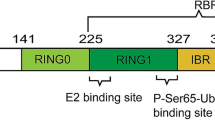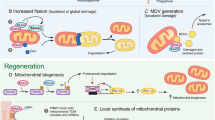Abstract
Mitochondrial dysfunction causes cellular damage and is linked to numerous pathological conditions. The prominent role of mitochondria in energy supply and cellular homeostasis highlights the importance of mitochondrial quality control mechanisms to preserve organelle function under stress and to eliminate irreversibly damaged mitochondria. Recent research revealed that two genes associated with familial Parkinson’s disease, Parkin and PINK1, function in mitochondrial quality control pathways.
Similar content being viewed by others
Literatur
Exner N, Lutz AK, Haass C et al. (2012) Mitochondrial dysfunction in Parkinson’s disease: molecular mechanisms and pathophysiological consequences. EMBO J 31:3038–3062
Rugarli EI, Langer T (2012) Mitochondrial quality control: a matter of life and death for neurons. EMBO J 31:1336–1349
Wenzel DM, Lissounov A, Brzovic PS et al. (2011) UBCH7 reactivity profile reveals parkin and HHARI to be RING/HECT hybrids. Nature 474:105–108
Smit JJ, Sixma TK (2014) RBR E3-ligases at work. EMBO Rep 15:142–154
Trempe JF, Sauve V, Grenier K et al. (2013) Structure of parkin reveals mechanisms for ubiquitin ligase activation. Science 340:1451–1455
Wauer T, Komander D (2013) Structure of the human Parkin ligase domain in an autoinhibited state. EMBO J 32:2099–2112
Koyano F, Okatsu K, Kosako H et al. (2014) Ubiquitin is phosphorylated by PINK1 to activate parkin. Nature 510:162–166
Sarraf SA, Raman M, Guarani-Pereira V et al. (2013) Landscape of the PARKIN-dependent ubiquitylome in response to mitochondrial depolarization. Nature 496:372–376
Klein P, Muller-Rischart AK, Motori E et al. (2014) Ret rescues mitochondrial morphology and muscle degeneration of Drosophila Pink1 mutants. EMBO J 33:341–355
Vilain S, Esposito G, Haddad D et al. (2012) The yeast complex I equivalent NADH dehydrogenase rescues pink1 mutants. PLoS Genet 8:e1002456
Muller-Rischart AK, Pilsl A, Beaudette P et al. (2013) The E3 ligase parkin maintains mitochondrial integrity by increasing linear ubiquitination of NEMO. Mol Cell 49:908–921
Iwai K, Fujita H, Sasaki Y (2014) Linear ubiquitin chains: NF-kappaB signalling, cell death and beyond. Nat Rev Mol Cell Biol 15:503–508
Morais VA, Haddad D, Craessaerts K et al. (2014) PINK1 loss-of-function mutations affect mitochondrial complex I activity via NdufA10 ubiquinone uncoupling. Science 344:203–207
Winklhofer KF (2014) Parkin and mitochondrial quality control: toward assembling the puzzle. Trends Cell Biol 24:332–341
Author information
Authors and Affiliations
Corresponding author
Additional information
Cathrin Schnack 1999–2005 Biochemie- und Molekularbiologiestudium, Universität Kiel. 2005–2008 Promotion am Lehrstuhl für Molekulare Biologie, Universität Tübingen. 2009–2014 Postdoc, Experimentelle Neurologie, Universitätsklinikum Ulm. Seit 2014 Postdoc am Lehrstuhl für Molekulare Zellbiologie, Universität Bochum.
Lena Berlemann 2007–2012 Biologiestudium, Universität Bochum. Seit 2013 Promotion am Lehrstuhl für Molekulare Zellbiologie, Universität Bochum.
Konstanze F. Winklhofer 1985–1990 Pharmaziestudium, Universität Regensburg. 1990–1997 Humanmedizinstudium, LMU München. 1994–1998 Promotion am Max-Planck-Institut für Biochemie, Martinsried, dort 1998–2005 Postdoc und Habilitation an der Fakultät für Chemie und Pharmazie der LMU München. 2005–2013 Gruppenleiterin am Adolf-Butenandt-Institut der LMU München. Seit 2013 Leitung des Lehrstuhls Molekulare Zellbiologie, Universität Bochum.
Rights and permissions
About this article
Cite this article
Schnack, C., Berlemann, L. & Winklhofer, K.F. Parkin — eine neuroprotektive E3-Ubiquitin-Ligase. Biospektrum 20, 724–728 (2014). https://doi.org/10.1007/s12268-014-0507-1
Published:
Issue Date:
DOI: https://doi.org/10.1007/s12268-014-0507-1




